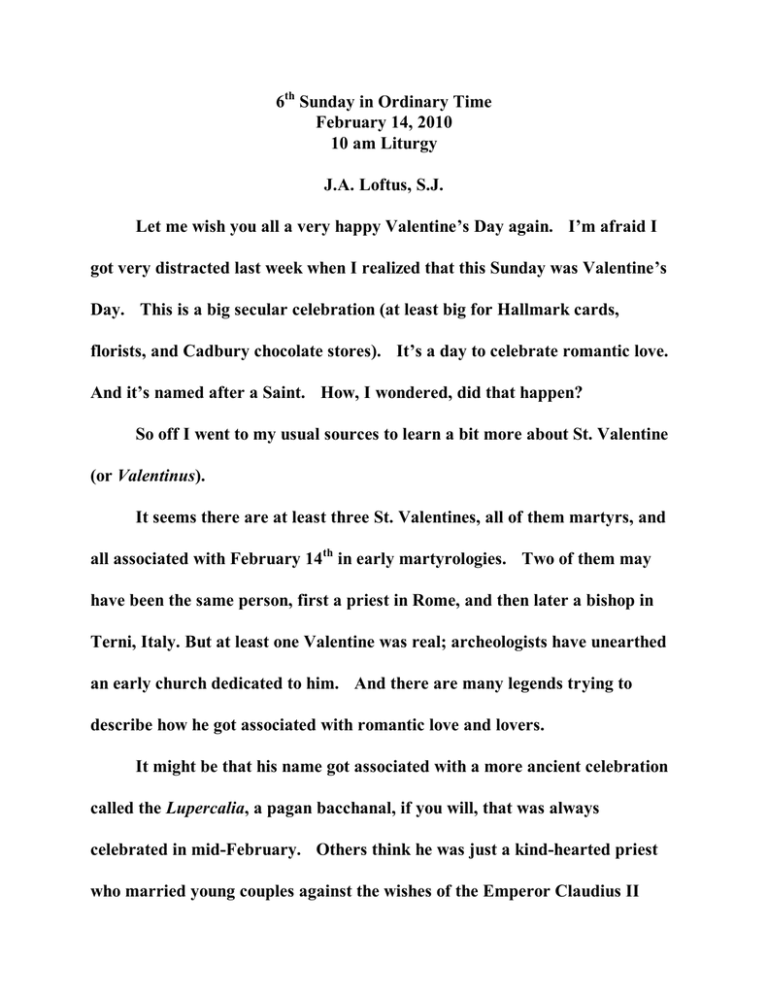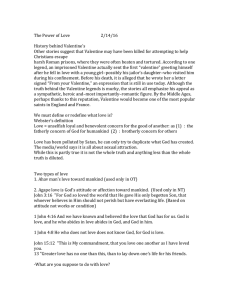6 Sunday in Ordinary Time February 14, 2010 10 am Liturgy
advertisement

6th Sunday in Ordinary Time February 14, 2010 10 am Liturgy J.A. Loftus, S.J. Let me wish you all a very happy Valentine’s Day again. I’m afraid I got very distracted last week when I realized that this Sunday was Valentine’s Day. This is a big secular celebration (at least big for Hallmark cards, florists, and Cadbury chocolate stores). It’s a day to celebrate romantic love. And it’s named after a Saint. How, I wondered, did that happen? So off I went to my usual sources to learn a bit more about St. Valentine (or Valentinus). It seems there are at least three St. Valentines, all of them martyrs, and all associated with February 14th in early martyrologies. Two of them may have been the same person, first a priest in Rome, and then later a bishop in Terni, Italy. But at least one Valentine was real; archeologists have unearthed an early church dedicated to him. And there are many legends trying to describe how he got associated with romantic love and lovers. It might be that his name got associated with a more ancient celebration called the Lupercalia, a pagan bacchanal, if you will, that was always celebrated in mid-February. Others think he was just a kind-hearted priest who married young couples against the wishes of the Emperor Claudius II (Claudius thought single men made better Roman soldiers than married ones, and so outlawed marriage). Still others think he got associated somehow with the ancient belief that mid-February was when birds mated. This theory is generally attributed to, or at least supported by, Chaucer who wrote about birds taking their lovers in mid-February. (I’m not kidding; it’s in his Parliament of Foules.) And St. Valentine is most often pictured with birds–not just a coincidence, I’m sure. But in any case, by the Middle Ages, Valentine was the king of all romance. A final legend explains the origin of sending cards and gifts today. It seems when Valentinus was in prison in Rome awaiting execution, he became quite friendly with the daughter of one of his jailors. He sent her affectionate letters signed: “From your Valentine.” She reciprocated by sending little gifts, usually roses, “To my Valentine.” The rest is Hallmark history. (One brief aside: it may be because of all this confusion in the legends, but in 1969 when the church “revised” its calendar of saints, Valentine seems to have gotten lost. He suffered the same fate as the beloved St. Christopher.) Now by this time you are probably wondering if there is a homily in here at all. Let’s see. What moved me down this path concerning St. Valentine was the frightening disconnect between typical secular associations of love and 2 today’s readings. In the scriptures, there is no cute little Cupid pointing his arrow at a passive, potential lover. Quite the contrary. In the scriptures today there is a radically different kind of love portrayed, and a very different kind of lover envisioned. And a question arises: what kind of lover do we want to be? Especially on Valentine’s Day! Now please do not misread me. There is absolutely nothing wrong with cute or even sloppy romantic love. Eros probably needs to be celebrated more in our world. But caritas (charity or agape) shares only roots with Eros. Its flowering looks quite different. The kind of love envisioned in scriptures is not something one “falls into” or “falls out of.” It is a decision, a choice, an “act of the will,” to chose a category you might not have heard a lot about in recent years. Michael Himes, a Boston College theologian, returns to St. Thomas Aquinas to explore the real meaning of a different kind of love. He does, of course, remind us all that most scholastic theology frequently sounds “dry as dust.” But it sometimes contains kernels that are worth considering. St. Thomas defines love (caritas, agape) as “the effective willing of the good of another.” (I warned you it was dry.) But unpacked, it’s interesting. Real love is not something that happens to you. It is a decision you 3 make–something you “will.” Nor is real love just a sentiment, a feeling. It is not an affective emotion as much as it is “an effective” willing. That’s quite different from just wishing someone well. It is not just benevolence–“gee, I hope you really get what you want and are happy.” Real love does something! And it does it effectively. I’m reminded of St. Ignatius: real love manifests itself in deeds more than in words (Spiritual Exercises, Contemplatio). Real love is not about me; it’s about “the you,” the other. And it can completely overwhelm you, and take over your life. Think of St. Paul. Listen again sometime to Jeremiah’s warning. Blessed is the one who trusts in the Lord, whose only hope is the Lord. And cursed is the one who foolishly trusts in anyone or anything else. This is a different horizon. And listen with fresh ears to Luke’s admonition and invitation. The “blessed,” the happy, the fortunate are those who can live and love in the reversal of all that we hold to be “common” sense. This is an inversion of all we usually hold to be self-evident. Wealth and reputation and even laughter all have their place. But so does poverty because we’ve shared so much. So does sadness for the sake of justice. So does hunger that springs from excessive generosity. Mindless acts of kindness–as bumper stickers have it. Real love is “the effective willing of the good” for another. And a world 4 of poverty and hunger, of sadness and insult, still waits. That world is ours–and it waits for us. I hope I have not ruined your chocolates and flowers, or even Cupid’s arrows. But there is a wider horizon against which the world celebrates Valentine’s Day today. And it is that horizon to which Jeremiah and Luke point. Nonetheless, I do hope you all have a wonderful–if perhaps slightly different–Valentine’s Day. To paraphrase one of my heros, Mr. Spock of Star Trek fame, live long and prosper. But love well! (For those of you keeping track of my sometimes bizarre homily references: yes, this is the first time I have ever cited both Mr. Spock and St. Thomas Aquinas in the same homily.) Happy Valentine’s Day! 5





